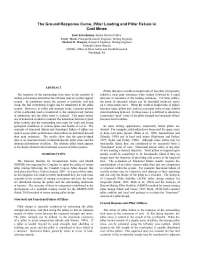Mining Publication: The Ground Response Curve, Pillar Loading and Pillar Failure in Coal Mines
Original creation date: July 2010
Authors: GS Esterhuizen, C Mark, MM Murphy
NIOSHTIC2 Number: 20037618
Proceedings of the 29th International Conference on Ground Control in Mining, Morgantown, West Virginia, July 27-29, 2010. Barczak T, ed., Morgantown, WV: West Virginia University, 2010; :19-27
The response of the surrounding rock mass to the creation of mining excavations determines the ultimate load on a pillar support system. In conditions where the ground is relatively soft and weak, the full overburden weight can be transferred to the pillar system. However, in stiffer and stronger rocks, a greater portion of the overburden load is transferred to the unmined coal barriers or abutments, and the pillar stress is reduced. This paper makes use of numerical models to examine the interaction between typical pillar systems and the surrounding rock mass for weak and strong geological conditions at various spans and depths of cover. The concepts of structural failure and functional failure of pillars are used to assess pillar performance when pillars are deformed beyond their peak resistance. The results show that the span-to-depth ratio is an important factor in determining the pillar stress and the ultimate deformation of pillars. The ultimate pillar strain appears to be closely related to the functional success of pillar systems.

NIOSHTIC2 Number: 20037618
Proceedings of the 29th International Conference on Ground Control in Mining, Morgantown, West Virginia, July 27-29, 2010. Barczak T, ed., Morgantown, WV: West Virginia University, 2010; :19-27
- Diagnosing and Controlling Moisture-Sensitive Roof in Coal Mines
- The Effects of Roof and Floor Interface Slip on Coal Pillar Behavior
- Elastic and Shear Moduli of Coal Measure Rocks Derived from Basic Well Logs Using Fractal Statistics and Radial Basis Functions
- Knowledge Management and Transfer for Mine Emergency Response
- MULSIM/NL Application and Practitioner's Manual
- MULSIM/NL Theoretical and Programmer's Manual
- Pillar Design
- Pillar Mechanics of Coal Mine Bursts: A Control Strategy
- Pillar Stability Issues Based on a Survey of Pillar Performance in Underground Limestone Mines
- Propagation of UHF Radio Waves in Limestone Room and Pillar Mines
- Reservoir Rock Properties of Coal Measure Strata of the Lower Monongahela Group, Greene County (Southwestern Pennsylvania), from Methane Control and Production Perspectives